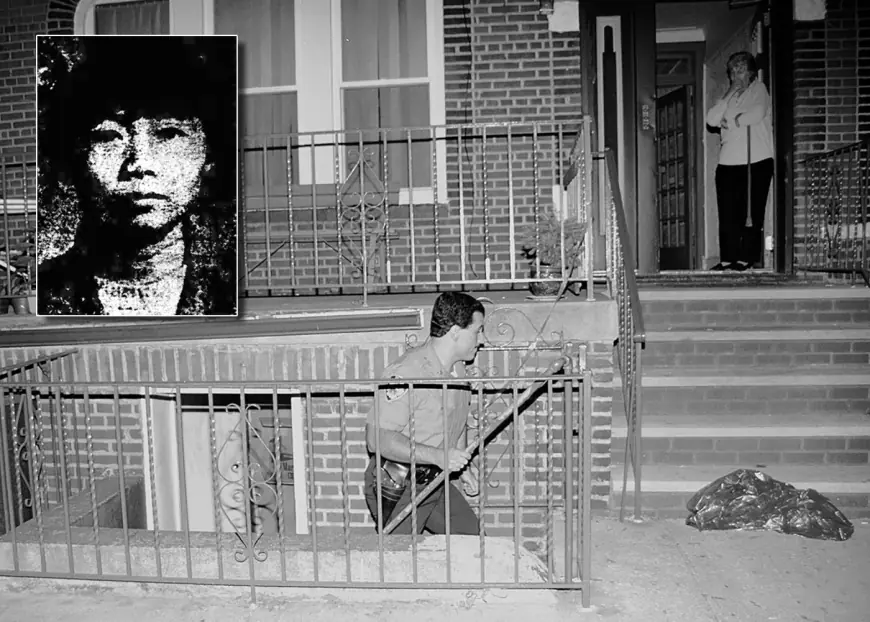‘King of Clubs’ killers seek early release, saying their young brains were not fully developed
Two Queens gang leaders who kidnapped a Chinese immigrant, raped and murdered her, then left a King of Clubs card on her corpse say they should get early release because their young minds weren't fully developed at the time.

Two Queens gang leaders who kidnapped a Chinese immigrant, raped and murdered her, then left a King of Clubs card on her corpse say they should get early release because their young minds weren’t fully developed at the time.
Jia Wu Chen and Fu Xin Chen were members of the Plum Blossom Boys, and leaders in the Chinese gang the Flying Dragons, when they kidnapped and tortured two women and a man in 1995, demanding ransoms from their families.
Their sadistic spree ended with a particularly gruesome slaying — one of their victims, a 39-year-old mother of two, Ko Lai Zhang, was found dead in a Borough Park basement in Brooklyn on Sept. 2, 1995.
The killing was dubbed the King of Clubs murder. Her left pinky finger had been chopped off, her head was crushed by a television, she had cords wrapped around her neck, and the killers stuffed the playing card and a taunting note down her back.
Jia Wu and Fu Xin pleaded guilty to avoid the death penalty, while another gang member, You Zhong Peng, was convicted at trial. All got life sentences.

The two men have been trying to get released through the First Step Act since 2021, only to have Brooklyn Federal Court Judge Edward Korman swat down their requests.
Now, they’re trying again, arguing in separate motions that because of their youth, their brains had not fully developed.
Fu Xin’s age has long been an issue in his prosecution — after his arrest, he claimed to be only 15 and ineligible for the death penalty, leading prosecutors to order x-rays that showed he had the joints of someone at least 20.
He’s now claiming he was 19 at the time of the crime, though federal prison records put his age at he time at about 24 years old. Jia Wu, meanwhile, argues in his motions that he was 23 at the time, though media accounts and federal prison records show he was 29.
Court filings and trial testimony describe a monstrous string of crimes, starting on Aug. 23, 1995, when the duo and others snatched Zhang, a Chinese immigrant seamstress, as she walked home from work in Queens. They also grabbed two other victims, a woman named Xue-Ying Dong a man named Xiu Fu Lin. All three were held in a Brooklyn apartment.
They made Zhang call her family in China to demand a $30,000 ransom, which would be delivered to their co-conspirators in China.

Zhang’s mother said she could only raise $5,000, so they started beating the victim. The kidnappers, who repeatedly raped Zhang, eventually drove Lin to a wooded area in Queens, where one of them shot him twice in the head. Somehow, he survived, and was able to testify at trial.
When the kidnappers found out Lin had lived, they strangled Zhang to death. The last remaining hostage, Dong, freed herself and started a fire that brought police to the Brooklyn apartment.
The killers stuffed the playing card, with a club suit that looked like a plum blossom, down her back along with a note written in Chinese, saying her family failed to pay the ransom and taunting cops to find them. Fu Xin left his fingerprints on the note.
Cops tracked the men’s pagers and found them a month later in Milpitas, a town near San Jose., Calif., before they could flee the county.

Korman sentenced the Jia Wu and Fu Xin in February 1997.
In an August filing, Fu Xin calls himself a reformed man, and plays up his age at the time of the crimes, referring to the Plum Blossom Boys as a “youth gang,” and describing other court decisions that factor in emotional maturity.
“When Chen was arrested in 1995, he was only 19 years old, with no prior record. Like many others, he was young and naive, without an adult role model, and had sought guidance in all the wrong places,” he wrote in his pro se filing. “Chen has a strong desire to give back to his community. He pictures himself guiding at-risk youth and becoming someone they can look up to, a role model he never had.”
Jia Wu, meanwhile, tried the emotional maturity argument in two earlier compassionate release requests this year, at one point referencing a cognitive neuroscience study that shows the brain doesn’t reach maturity until the age of 25.
Korman rejected those requests, writing, “The facts of this case belie any assertion that he lacked impulse control or the ability to understand the consequences of his actions.”

In September, he came back with a new motion to vacate his sentence, with his lawyer, Robert Adinolfi arguing that because he was younger than 25 years old, he should be considered a juvenile, making a life without parole sentence unconstitutional. In the filing, Adinolfi pointed out that life sentences without parole are considered cruel and unusual punishment in most countries.
Assistant U.S. Attorney Stephanie Pak, the prosecutor opposing his request, said the crimes were not impulsive.
“The defendant was not a peer-pressured teenager acting on impulse,” she wrote. “He was a 23-year-old leader in a multinational criminal organization that coordinated kidnappings across the country and directed the collection of ransom money in China. His actions were calculated, coordinated, and sadistic.”
What's Your Reaction?









































































































